| Columns Retired Columns & Blogs |
Results?
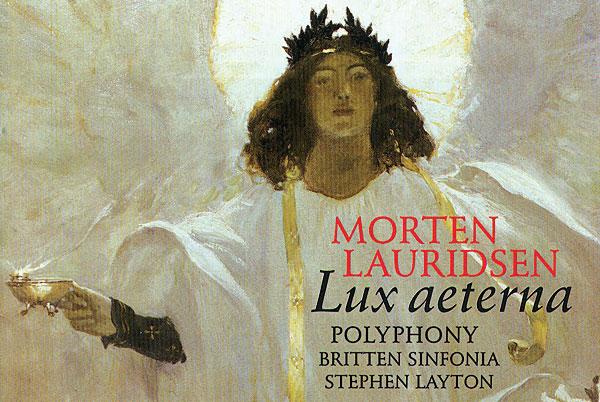
The premise is simple: Create seven classical concert programs for a fantasy symphony orchestra's season. But to make it more interesting, you can't program works by any of these composers: Bach, Beethoven, Brahms, Handel, Haydn, Mahler, Mendelssohn, Mozart, Schubert, Stravinsky, Tchaikovsky, or Wagner. Did you catch the "no Beethoven" part? Good.
My goal is to get people thinking about great orchestral works that have fallen off the radar screens, or at least aren't by the Top 12 composers. There are many second-rank composers who wrote first-rate music that is rarely heard in concert. However, I believe that over the past 40 years, orchestral programming in the US has substantially narrowed, for a number of reasons: lack of conviction (or lack of the courage of their convictions) on the part of conductors or boards; audiences that appear to be stuck in the mud; and lack of time and money to rehearse unfamiliar works.
The last might be the most important, in that some orchestras might fear that their audiences are more interested in pointing out minor lapses in performance than in listening to unfamiliar music. Achieving note-perfect performances takes a lot of rehearsal time, which costs a lot of money. But another factor may be that many regional orchestras share their conductor with one or more other orchestras, and because such "fly-in" conductors tend to repeat their programs, their timidity is multiplied.
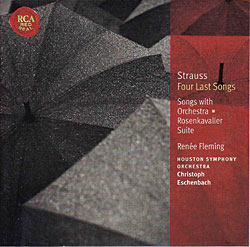 Please put together a season consisting of nothing but great works from composers who are not at the top of the usual rankings. Each fantasy-symphony concert should have an opening work and a concerto for the first half; an intermission; and at least one major work for the second half. In place of a concerto, there can be a major work for voices and/or chorus with orchestra. You may also, if you wish, devote an entire concert to one major work and forgo an intermission, or program multiple shorter works in either or both halves. Total playing time for each concert should run from about 60 to no more than 100 minutes. I will judge the entries by how the concerts work as concerts and how the season holds up as a season. Are these concerts I'd want to attend? Is this a season I'd want to subscribe to?
Please put together a season consisting of nothing but great works from composers who are not at the top of the usual rankings. Each fantasy-symphony concert should have an opening work and a concerto for the first half; an intermission; and at least one major work for the second half. In place of a concerto, there can be a major work for voices and/or chorus with orchestra. You may also, if you wish, devote an entire concert to one major work and forgo an intermission, or program multiple shorter works in either or both halves. Total playing time for each concert should run from about 60 to no more than 100 minutes. I will judge the entries by how the concerts work as concerts and how the season holds up as a season. Are these concerts I'd want to attend? Is this a season I'd want to subscribe to?
Just as important, is this a season that will attract new subscribers, and attract listeners who are new to classical music? You must strike a balance between the familiar and the unknown, in both composers and pieces, and between "comforting" and "challenging" in the character of the music. I am not looking for obscurity for its own sake. Your season must be able to bring in as much money as any other season—that's the artistic challenge. I want to be able to share the winning lists with my musician friends and have them say, "Hey, that's an unusual program that really works. I'll tell the conductors I know!"
The Rules:
1) Entries must be received by February 29, 2012, at stletters@sorc.com, with the subject line "Fantasy Symphony." Only one entry per person, please. Please provide your real name. Winners' names, cities, and states will be made public, but not their e-mail addresses. All entries become the property of Source Interlink Media. Stereophile employees, and audio- and music-industry professionals (as distinct from musicians and singers), may submit lists for judging hors-concours, but they will not be eligible to receive prizes.
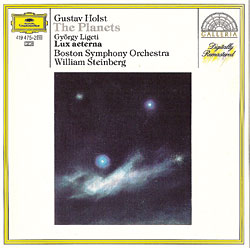 2) Your list must consist of classical compositions for seven fantasy symphony-orchestra concert programs, as outlined above. No alternate picks, please. You must provide the composer and the full title of each work; additional information, such as key or opus number, is not necessary. Each composition must be the subject of at least one commercial recording that is currently available, whether new, used, on-demand, or via download.
2) Your list must consist of classical compositions for seven fantasy symphony-orchestra concert programs, as outlined above. No alternate picks, please. You must provide the composer and the full title of each work; additional information, such as key or opus number, is not necessary. Each composition must be the subject of at least one commercial recording that is currently available, whether new, used, on-demand, or via download.
3) Please do not provide explanations. The logic of your selections and their attractiveness should be self-evident. Similarly, please do not nominate soloists for any concertos you program.
4) Judging will be entirely on the basis of the likelihood that a real symphony orchestra scheduling your fantasy season will enjoy a series of smashing artistic, critical, popular, and financial successes.
5) Judging will be by John Marks.
6) Each of the 12 winners will receive a single CD of his or her choice from the Stereophile online store.
My Fantasy-Symphony Season
Here are my seven fantasy-symphony concert programs.
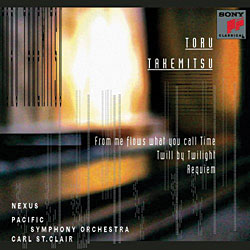 Concert 1
Concert 1
Toru Takemitsu: From Me Flows What You Call Time (1990) (32 min.)
Intermission
Frederick Delius: Piano Concerto (1906) (22 min.)
Ralph Vaughan Williams: Fantasia on a Theme by Thomas Tallis (1919) (14 min.)
TT: 68 min.
Concert 2
Jean Sibelius: Night Ride and Sunrise (1907) (16 min.)
Alexander Glazunov: Violin Concerto (1904) (22 min.)
Intermission
Jean Sibelius: Symphony 7 (1924) (24 min.)
TT: 62 min.
Concert 3
Roy Harris: Symphony 3 (1938) (16 min.)
Richard Strauss: Four Last Songs (1948) (26 min.)
Intermission
Howard Hanson: Symphony 2, "Romantic" (1930) (32 min.)
TT: 74 min.
Concert 4
Fikret Amirov: Struggle and Immortality from A Tale of Nasimi (1969) (3 min.)
Dmitri Shostakovich: Piano Concerto 2 (1957) (22 min.)
Intermission
George Butterworth: A Shropshire Lad (1911) (11 min.)
Claude Debussy: La Mer (1905) (24 min.)
TT: 60 min.
Concert 5
F.S. Kelly: Elegy in Memoriam Rupert Brooke for Harp and Strings (1915) (9 min.)
Ralph Vaughan Williams: An Oxford Elegy (1949) (24 min.)
Intermission
Morten Lauridsen: Lux Æterna (1997) (28 min.)
TT: 61 min.
Concert 6
Sir John Barbirolli: An Elizabethan Suite (1942) (11 min.)
Edward Elgar: Cello Concerto (1919) (28 min.)
Intermission
Edward Elgar: Symphony 2 (1911) (52 min.)
TT: 91 min.
Concert 7
Modest Mussorgsky: Dawn on the Moskva River, from Khovanshchina (1883) (8 min.)
Sergei Rachmaninoff: Rhapsody on a Theme of Paganini, Op. 43 (1934) (25 min.)
Intermission
Gustav Holst: The Planets (1916) (46 min.)
TT: 79 min.
Average TT: 71 min.
I think this proves that you can exclude 12 top-shelf composers, yet still have a captivating symphony season. My season tries to balance pieces most concertgoers may never have heard in concert (the Khovanshchina prelude) with pieces almost everyone knows (The Planets). And unless I missed something, with only one exception, my entire season is all 20th century. (Yours, of course, doesn't have to be.)
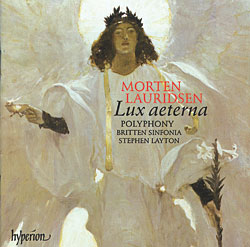 Here are a few observations on how I put together my fantasy season, in hopes that a peek behind the curtain will help you construct your winning entry. Much of the music I program is relatively unfamiliar, and some of that music might be moderately challenging for those stuck in the "Top 100 Orchestral Pieces," but none of my picks are off-the-wall or confrontational. Remember, your season has to pull in real money from audiences whose comfort zone is more likely to be Your Mozart Minute or Drivetime with Dvorák on their car radio, than Pandora's all-Lutoslawski channel (assuming such exists).
Here are a few observations on how I put together my fantasy season, in hopes that a peek behind the curtain will help you construct your winning entry. Much of the music I program is relatively unfamiliar, and some of that music might be moderately challenging for those stuck in the "Top 100 Orchestral Pieces," but none of my picks are off-the-wall or confrontational. Remember, your season has to pull in real money from audiences whose comfort zone is more likely to be Your Mozart Minute or Drivetime with Dvorák on their car radio, than Pandora's all-Lutoslawski channel (assuming such exists).
My season has a definite architecture: it's a big tent, supported by the three tentpoles of the piano concertos—simply because piano is, by far, the most popular concerto instrument, followed by the violin and the cello. Such are the realities. In order to program a season that is not a Quixotic money pit, you have to deal with the realities. One programming goal was to avoid two successive concerts with the same kind of soloist; eg, two piano concertos in a row.
The first piano-concerto tentpole is the Delius, hardly ever heard but very approachable. The middle tentpole—Shostakovich's Piano Concerto 2—is not heard nearly as much as the purely Mozartean loveliness of its slow movement merits. The third pole is Rachmaninoff's crowd-pleasing Rhapsody. That's the payoff at the end of the year for having heard two piano concertos not likely heard before.
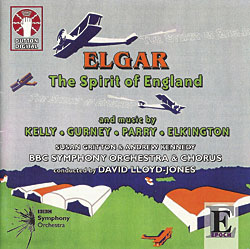 Immediately inside the outer tentpoles are the concertos for strings: Glazunov's warmly Romantic one for violin, and Elgar's elegiac cello concerto. Bracketing the middle piano concerto are works for solo voice (Strauss's plangent orchestral songs), for choir and orchestra (Lauridsen's Lux Æterna), and for speaker and choir and orchestra (Vaughan Williams' An Oxford Elegy).
Immediately inside the outer tentpoles are the concertos for strings: Glazunov's warmly Romantic one for violin, and Elgar's elegiac cello concerto. Bracketing the middle piano concerto are works for solo voice (Strauss's plangent orchestral songs), for choir and orchestra (Lauridsen's Lux Æterna), and for speaker and choir and orchestra (Vaughan Williams' An Oxford Elegy).
To keep the audience from fleeing during the first concert's intermission, which would deprive them access to the luminous, floating sound-world of Takemitsu's percussion concerto From Me Flows What You Call Time, I programmed that first, keeping the crowd-pleasing Tallis Fantasia until last. Feel free to similarly bend the rules for the greater good—if you're going to win, you'll have to think creatively, and in such practical and pragmatic terms.
I tried to shape each concert so that the pieces would illuminate each other without being clones of each other. Few people have heard of Azerbaijani composer Fikret Amirov, but I think the two brief, bracingly energetic excerpts from his A Tale of Nasimi make a perfect curtain-raiser for Shostakovich's Piano Concerto 2, which itself begins energetically. Similarly, Butterworth's A Shropshire Lad rhapsody is a great setup for the opening pages of Debussy's La Mer, as Kelly's unknown Elegy is for Vaughan Williams' Oxford Elegy. I think that the Mussorgsky and Rachmaninoff shed light on each other, and that the playful scintillation of the Rhapsody on a Theme of Paganini finds pre-echoes in the Mercury movement of Holst's The Planets.
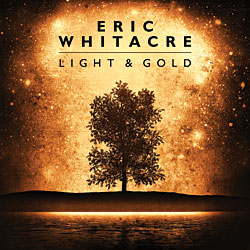 If you don't recognize some of my selections, listen to them on YouTube, via sound samples on ArkivMusic.com or Amazon.com, or check them out of your public library. I look forward to receiving your entries! Surprise me! (You can also send in constructive criticism of my season without making up a season of your own. But there's no prize for that.)
If you don't recognize some of my selections, listen to them on YouTube, via sound samples on ArkivMusic.com or Amazon.com, or check them out of your public library. I look forward to receiving your entries! Surprise me! (You can also send in constructive criticism of my season without making up a season of your own. But there's no prize for that.)
My 2012 R2D4 Runners-up
As usual, there were more serious contenders for my picks for this year's "Records To Die For" than slots available. You really should check out my two nearest runners-up: Kenny Rankin's Inside (CD, Sly Dog SLY 3009, 1975/2010) and Eric Whitacre's Light & Gold (CD, Decca B0014850-02, 2010).


Hi-
Thanks for your interest. The results are in process, and that process will take a couple or a few more weeks. I do not want to make any snap judgments, so I am researching the many many many unfamiliar pieces, and pondering how this concert versus that concert at that point in the season will pan out in terms of attendance and box office.
Beyond that, it will be a major task to format the winning entries to Stereophile's style sheet, and then I have to write the introductory copy. But the present work is hunting up at least YouTube performances of pieces that are new to me, to John Atkinson, and most of my music-loving friends.
I think that nearly all the entries are interesting, and the potential winners are impressive beyond anything I had hoped for.
So, please be patient.
JM

Since I had fun putting together my entry, I wrote up the following note for Facebook friends. I'd love to see some of the other entrants talk about their approaches to programming their seasons.
Romain Kang, Sunnyvale, California
My season is a geographical cycle beginning and ending in the US. Each concert has some nation or region as its center of gravity, including at least one living composer and one "party piece" (in my opinion). Whereas JM's example season employed piano concerti as "tent poles" in his structure, I have given concerti a more ornamental role, leaving just Michael Ching's single-movement piano concerto as representative, with less prominent instruments getting more solo turns.
Bracketing the season are probably the best-known tunes, by John Williams and Aaron Copland; Copland's final movement is built on the famous "Fanfare for the common man", in effect, ennunciating a return home. I hope the visceral experience of the live orchestra allows the audience to hear these pieces anew. I got a bit punchy with Concert 1, which has all living American composers named John, in reverse alphabetical order and descending age.
The other programs seem strong enough, though more time to listen, reflect, and revise would have helped. In particular, the Asia-centered program (Concert 5) was a challenge because I know its composers least, but I felt I could not leave it out. Choosing a concerto was the most time-consuming task. I would have liked to include Gang Situ's Double concerto for violin and erhu, but could not find a commercial recording. My first draft put Chen Yi's Percussion concerto in the concerto spot, but timidity got the better of me, so instead there is a violin concerto from Unsuk Chin, a Korean living in Germany. Also, Tan Dun quotes Beethoven's Third symphony liberally, and could be a disqualifier depending on interpretation of contest rules.
The discipline to leave out material was crucial; I took out an entire French program with some of my choral favorites. There is both really good stuff and really fun trash in the symphonic world that would have been enjoyable to share. In the best case, though, you leave the audience wanting more after the final chords have sounded.

@Romain
Congrats at result! I was interested in your Asia-centered program because I also wanted to include non-western music. I had in mind a concert built around Tan Dun's 'Symphony 1997' or Ravi Shankar's Sitar Concerto. Like you I felt I could not leave it out - but I did. Unfortunately the combination of my limited knowledge of asian music and the necessity to make a coherent program meant I just had to give up. Thanks for your post and I will be looking up those many pieces you mention that are new me.

One friend passed the Stereophile lists around her classical music meetup group, and one keen reader noticed that I had a nonexistent piece in my Concert 5. There is no "American" overture by Borodin -- it's by Prokofiev. The error is surely a sloppy edit on my part, since I had Borodin's "Polovtsian dances" slotted there in an early draft. I'm grateful that the editors cut me some slack there!

When browsing the classical music composers catalogue, one will find the S category particularly large. Included in this section is one Stravinsky, Igor. This name is conspicously absent from the Fantasy Season contest. (I didn't enter the contest, so I'm not griping my entry didn't win.) Has Stravinsky's music gone out of fashion? Is his Rite of Spring, which caused the audience to riot during the 1913 premiere, still considered "too modern" 100 years later? I understand why audiophiles would not include the Romantic composers and earlier eras- that music lacks the instrumental color that the French Impressionists and Late Romantic composers brought to orchestral sound. But, c'mon, no Stravinsky? Nary a Firebird, or Rite of Spring to be found???

from Mr Marks rules:
But to make it more interesting, you can't program works by any of these composers: Bach, Beethoven, Brahms, Handel, Haydn, Mahler, Mendelssohn, Mozart, Schubert, Stravinsky, Tchaikovsky, or Wagner. Did you catch the "no Beethoven" part? Good.
Love Stravinsky, but like Mr Marks I belive that he is quite the staple on the concert stage!
Myself, I was quite surprized to be shareing second price!
Did not have a very decided way of structuring my season sugestion. I started out by choosing 7 underplayed works that I dearly would love to hear an orchstra play. Then adding a work that I think would contrast the main work really well, then I strongly belive that every concert should start with a musical Apéritif (i.e an overture) which I added.
Reading back my own season there emerged a red thread with a decent amount of "American" music, wich I feel is under played repertoir around the globe. The nest time the collour oif the fabric might be quite diffrent!
/ptr (in Sweden)